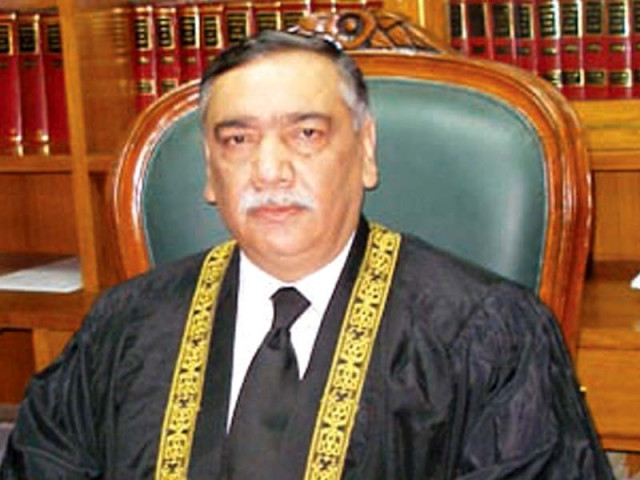CJP creates history in criminal justice system
MTMCs conclude 18,242 murder, narcotics trials in record 160 working days

Justice Asif Saeed Khosa. PHOTO: EXPRESS
The Model Criminal Trial Courts (MTMCs), established by CJP Khosa, concluded 18,242 murder and narcotics trials in record 160 working days.
Of 18,242, 6,953 murder and 11,289 narcotics trials were concluded with 82,622 witnesses recording their statements.
No murder trial is pending in 18 districts/tehsils in the country.
A senior lawyer, who is conducting a murder trial in Punjab, lauded the approach of CJP Khosa in giving priority to expeditious disposal of murder cases.
In the last two decades, sessions courts have been overburdened due to adjudication of different categories of cases like pre-arrest bail, post-arrest bail, 22-A applications and other criminal matters.
Courts were spending most of their time in deciding such cases while murder trial was their least priority.
Even murder case proceedings were starting in the afternoon; therefore, trial proceedings were adjourned without any significant progress due to lack of time. However, since the establishment of model courts, trial was being concluded in a week, he added.
The senior lawyer believed that quality of judgements by model courts were satisfactory. "If you compare model courts' rulings with the judgements issued by earlier courts after the passage of five or six years, you will conclude that incumbent MTMCs are working very efficiently," he said.
Likewise, Supreme Court led by CJP Khosa had been successful in clearing the backlog of criminal appeals in the apex court. There was zero pendency of criminal appeals at Karachi, Quetta and Peshawar registries. It is expected that there would be zero pendency of criminal appeals in the apex court in the near future.
Challenges
Although model courts were performing effectively, they were also facing challenges. There was criticism of the high acquittal rate. Last month, CJP Khosa also expressed his concern over the alarming acquittal rate of 69% in criminal cases decided in Punjab during the period January 1, 2019 to July 31, 2019 due to flaws in the investigation system.
District Assessment Committees (DACs) have been established to evaluate the judgements passed in murder cases and review cases of acquittal and bail. Each DAC comprises a retired district and sessions judge having significant expertise in criminal cases, SP investigation, investigating officer, prosecutor, senior lawyer having experience in criminal cases and a young lawyer.
CJP Khosa also stressed upon the National Police Bureau to devise a uniform strategy across the country regarding correct narration of FIR, unnecessary arrests and false evidence so that misuse of power for registration of criminal cases could be discouraged.
On March 20, the Supreme Court declared that the rule "falsus in uno, falsus in omnibus" (false in one thing, false in everything) would be an integral part of jurisprudence in criminal cases and it would be followed and applied by all courts in the country in letter and spirit.
The Latin rule held that a witness who testified falsely about one matter was not credible to testify about any matter because "the presumption that the witness will declare the truth ceases as soon as it manifestly appears that he is capable of perjury" and that "faith in a witness' testimony cannot be partial or fractional". Currently, the country's courts are following the same principle.
In the 31-page verdict, CJP Khosa also directed that a witness found by court to have resorted to deliberate falsehood on a material aspect "shall, without any latitude, invariably be proceeded against for committing perjury".
The court noted that the rule "falsus in uno, falsus in omnibus" had been held by the superior court of this country in the past to be inapplicable to criminal cases which had gradually encouraged and emboldened witnesses appearing in trials of criminal cases to indulge in lies, making it increasingly difficult for courts to discover the truth and dispense justice.
A senior lawyer believed that it would take a couple of years to streamline things in view of this judgement. However, he expressed concern that a few judges in high courts were still not following this jurisprudence evolved through Justice Khosa's verdict. There was a need to improve efficiency at the high court level.
The lawyer believed that the criminal justice system would be fully revamped with the upgradation of society, when there would be no false witness and complainant would not involve innocent people in the case. Likewise, people would volunteer themselves to appear as witnesses.
However, Pakistan Bar Council Vice Chairman Syed Amjad Shah reserved his opinion over working of model courts until their comparison with performance of ordinary courts.
Senior lawyers believed that the CJP got landmark achievements in criminal justice system but there was a need to take action over the abuse of human rights by state functionaries and there was no forum to redress grievances against the executive.



1724319076-0/Untitled-design-(5)1724319076-0-208x130.webp)















COMMENTS
Comments are moderated and generally will be posted if they are on-topic and not abusive.
For more information, please see our Comments FAQ